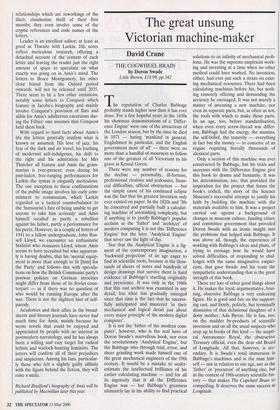The great unsung Victorian machine-maker
David Crane
THE COGWHEEL BRAIN by Doron Swade Little Brown, £14.99, pp.342 The reputation of Charles Babbage probably stands higher now than it has ever done. For a few hopeful years in the 1830s his showman demonstrations of a 'Differ- ence Engine' were one of the attractions of the London season, but by the time he died in 1871 — hating 'mankind in general, Englishmen in particular, and the English government most of all' — there were no more than a handful of mourners to follow one of the greatest of all Victorians to his grave in Kensal Green.
There were any number of reasons for the decline — personality, ill-fortune, professional rivalries and jealousies, finan- cial difficulties, official obstruction — but the simple cause of his continued eclipse was the fact that his greatest invention only ever existed on paper. In the 1820s and '30s he conceived and partially built a calculat- ing machine of astonishing complexity, but if anything is to justify Babbage's popular acclaim as the 'father' and 'architect' of modern computing it is not this 'Difference Engine' but the later 'Analytical Engine' that never saw the light of day.
Not that the Analytical Engine is a fig- ment of the contemporary imagination, a `backward projection' of an age eager to find its scientific roots, because in the thou- sands of sheets of notes and hundreds of design drawings that survive there is hard evidence of Babbage's startling originality and prescience. It was only in the 1960s that this vast archive was examined in any detail, but what has gradually emerged since that time is the fact that he success- fully anticipated and mastered 'in their mechanical and logical detail just about every major principle of the modern digital computer'.
It is not the 'father of the modern com- puter', however, who is the real hero of Doron Swade's marvellous book, nor even the revolutionary 'Analytical Engine', but the Babbage who through trial, error, and sheer grinding work made himself one of the great mechanical engineers of the 19th century. It would be a mistake to under- estimate the intellectual brilliance of his earlier calculating machine — and for all its ingenuity that is all the Difference Engine was — but Babbage's greatness ultimately lay in his ability to find practical solutions to an infinity of mechanical prob- lems. He was the supreme empiricist work- ing and inventing at a time when no other method could have worked. No invention, either, had ever put such a strain on exist- ing mechanical resources. There had been calculating machines before his, but noth- ing remotely offering and demanding the accuracy he envisaged. It was not merely a matter of inventing a new machine, nor even its separate parts, but, as often as not, the tools with which to make those parts. In an age, too, before standardisation, when even every screw-thread was differ- ent, Babbage had the energy, the stamina, the self-belief, the temerity — everything in fact but the money — to conceive of an engine requiring literally thousands of identical parts.
Only a section of this machine was ever constructed by Babbage, but his trials and successes with the Difference Engine give this book its drama and humanity. It was his determination, too, that provided the inspiration for the project that forms the book's codicil, the story of the Science Museum's successful attempt to justify his faith by building the machine with the materials available to him. It was a project carried out against a background of changes in museum culture, funding crises, and committee government that provided Doron Swade with an ironic insight into the problems that helped sink Babbage. It was above all, though, the experience of working with Babbage's ideas and plans, of trying to envisage how he would have solved difficulties, of responding to chal- lenges with the same imaginative empiri- cism, that gave Swade and his team the sympathetic understanding that is the great strength of this book.
There are lots of other good things about it. He makes the loyal, argumentative, brui- sing, obsessive Babbage a very endearing figure. He is good and fair on the support- ing cast, and firmly, politely, but terminally dismissive of that delusional daughter of a dotty mother, Ada Byron. He is fun, too, on the madder by-products of scientific invention and on all the usual suspects who crop up in books of this kind — the scepti- cal Astronomer Royal, the obstructive Treasury official, even the dear old Board of Longitude. All that, however, is sec- ondary. It is Swade's total immersion in Babbage's machines and in the man him- self — not in relation to our age, not as the `father' or 'precursor' of anything else, but in the context of 19th-century scientific his- tory — that makes The Cogwheel Brain so compelling. It deserves the same success as Longitude.


























































 Previous page
Previous page